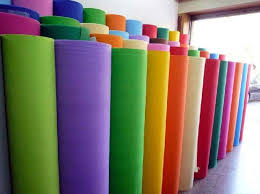How Non Woven Fabric is Shaping the Future of Textiles
The textile industry is undergoing a profound transformation, and at the heart of this change lies the innovative use of non-woven fabrics. These versatile materials, characterized by their unique manufacturing processes, are redefining the landscape of textiles and opening up new possibilities across a range of industries. Jhanji TextilesJhanji Textiles, a pioneering brand in the field, is at the forefront of this revolution, spearheading advancements that showcase the transformative potential of non-woven fabrics in shaping the future of textiles.
Understanding Non-Woven Fabrics
Non-woven fabrics are textiles made from fibers that are bonded together through mechanical, thermal, or chemical processes, rather than being woven together like traditional fabrics. This results in a fabric with distinct properties, including:
- Versatility: Non-woven fabrics can be engineered to have specific characteristics such as absorbency, strength, and breathability, making them suitable for a wide range of applications.
- Customizability: Manufacturers can tailor non-woven fabrics to meet the unique requirements of different industries and applications, offering flexibility and versatility in design.
- Sustainability: Non-woven fabrics can be produced using recycled materials and eco-friendly processes, contributing to sustainability efforts in the textile industry.
The Role of Non-Woven Fabrics in Modern Textiles
Non-woven fabrics are playing a pivotal role in shaping the future of textiles across various sectors:
1. Healthcare and Hygiene
In the healthcare sector, non-woven fabrics are essential for the production of medical textiles such as surgical gowns, masks, and wound dressings. Their ability to provide barrier protection, breathability, and comfort makes them indispensable in medical settings. Jhanji Textiles is a leading supplier of high-quality non-woven fabrics for medical applications, ensuring the safety and well-being of healthcare professionals and patients alike.
2. Environmental Sustainability
As the global focus on sustainability intensifies, non-woven fabrics are emerging as a key player in the quest for eco-friendly textiles. By using recycled materials and adopting sustainable manufacturing practices, non-woven fabric manufacturers like Jhanji Textiles are contributing to efforts to reduce the environmental impact of the textile industry. From biodegradable materials to energy-efficient production processes, these innovations are paving the way for a more sustainable future.
3. Advanced Filtration
Non-woven fabrics are revolutionizing the filtration industry, providing efficient solutions for air and water purification. Their porous structure and high surface area make them ideal for capturing particles and contaminants, ensuring clean and safe environments. Jhanji Textiles specializes in the production of advanced filtration media, delivering high-performance solutions for a wide range of applications, from industrial filtration systems to residential air purifiers.
4. Automotive and Transportation
In the automotive sector, non-woven fabrics are used for various applications such as interior trim, acoustic insulation, and engine components. Their lightweight, durable, and versatile nature makes them well-suited for automotive applications, helping to improve fuel efficiency, reduce noise, and enhance comfort. Jhanji Textiles supplies non-woven fabrics to leading automotive manufacturers, contributing to the development of innovative and sustainable transportation solutions.
5. Packaging and Industrial Applications
Non-woven fabrics are also finding increasing use in packaging and industrial applications, where they are valued for their strength, durability, and versatility. From protective packaging materials to industrial wipes and abrasives, non-woven fabrics offer cost-effective solutions for a wide range of industrial needs. Jhanji Textiles produces high-quality non-woven fabrics for packaging and industrial applications, meeting the demanding requirements of modern manufacturing environments.
The Future of Non-Woven Fabrics in Textiles
As technology advances and consumer demands evolve, the role of non-woven fabrics in textiles will continue to expand. From smart textiles with embedded sensors and electronics to biodegradable fabrics made from sustainable materials, the future of non-woven fabrics holds endless possibilities. With its commitment to innovation and quality, Jhanji Textiles is poised to lead the way in shaping this future, driving advancements that will redefine the textile industry for years to come.
Conclusion
Non-woven fabricsNon-woven fabrics are playing a transformative role in the textile industry, offering innovative solutions for a wide range of applications. From healthcare and hygiene to environmental sustainability, advanced filtration, automotive, and industrial applications, non-woven fabrics are reshaping the future of textiles in profound ways. With its expertise, commitment to quality, and focus on innovation, Jhanji Textiles is at the forefront of this revolution, driving advancements that will shape the textile industry for generations to come.



Comments
Post a Comment